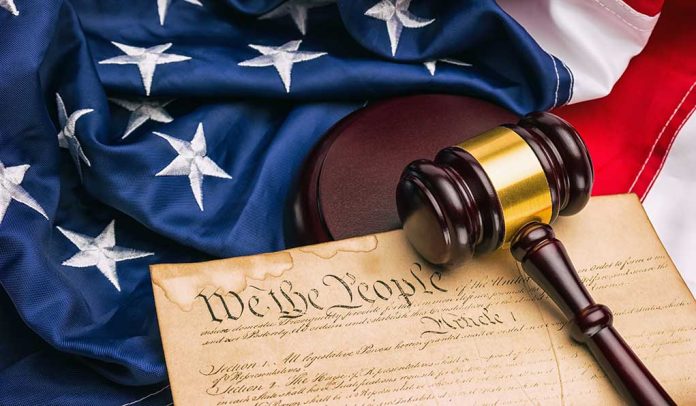
Vice President Kamala Harris’s recent comments on the Bill of Rights have ignited a fierce debate about political leaders’ grasp of constitutional principles.
At a Glance
- Harris’s discussion on the Bill of Rights omitted key amendments, sparking concern.
- The debate highlights the importance of leaders understanding fundamental constitutional documents.
- Harris’s comments have opened discussions about which amendments require more focus.
- The controversy underscores the need for political figures to balance contemporary issues with historical principles.
Harris’s Bill of Rights Discussion Raises Eyebrows
Vice President Kamala Harris, known for her groundbreaking role as the first black and Asian-American woman to lead a major party’s presidential ticket, has found herself at the center of a constitutional controversy. During a recent public appearance, Harris’s discussion of the Bill of Rights notably omitted mention of several crucial amendments, raising questions about the depth of her constitutional knowledge.
This oversight has not gone unnoticed, especially given Harris’s position as second-in-command to the President of the United States. Critics argue that a thorough understanding of the Constitution, including all amendments, is crucial for those in high office. Supporters, however, contend that the focus should be on Harris’s overall message rather than specific omissions.
The Importance of Constitutional Literacy in Leadership
The controversy surrounding Harris’s comments has reignited a broader debate about the level of constitutional knowledge expected from political leaders. Many argue that a comprehensive understanding of foundational documents like the Bill of Rights is essential for those tasked with upholding and defending the Constitution.
“People who have been unable to get abortion care where they live, who have to travel, people who have suffered obstetric complications and are unable to get the care they need because of the abortion bans,” said Dr. Daniel Grossman.
This incident has also sparked discussions about which constitutional amendments require more attention in public discourse. Some argue that certain rights, such as freedom of speech and the right to bear arms, are often at the forefront of political debates, while others are overlooked.
Balancing Contemporary Issues with Historical Principles
The debate over Harris’s comments highlights the challenge political leaders face in addressing current issues while remaining true to historical constitutional principles. This balancing act is particularly evident in discussions about contentious topics such as abortion rights, where Harris has been a vocal advocate.
“You want to talk about this is what people wanted? Pregnant women who want to carry a pregnancy to term, suffering from a miscarriage, being denied care in an emergency room because health care providers are afraid they might go to jail and she’s bleeding out in a car in the parking lot?” Kamala Harris said during the debate.
Harris has been at the forefront of the abortion rights debate, emphasizing the medical challenges women face since the Supreme Court overturned the national right to abortion in 2022. However, her approach has not been without criticism. Some argue that her stance on abortion lacks specificity, with Harris advocating for reinstating Roe v. Wade protections without detailing specific restrictions she might support.
The Need for Accurate and Contextual Political Discourse
The controversy surrounding Harris’s Bill of Rights discussion also underscores the importance of accuracy and context in political statements. A fact-check of Harris’s speech at the Democratic National Convention revealed 12 misleading or lacking-in-context statements, highlighting the need for precise language when discussing constitutional matters.
As the 2024 election cycle heats up, the public’s scrutiny of political leaders’ constitutional knowledge is likely to intensify. This incident serves as a reminder that in an era of heightened political polarization, a solid grasp of constitutional principles is not just expected, but demanded of those seeking the highest offices in the land.
Sources:
- https://www.pbs.org/newshour/politics/fact-checking-the-harris-trump-debate
- https://www.bbc.com/news/articles/c5y58l08082o
- https://apnews.com/article/abortion-debate-kamala-harris-donald-trump-35078cdb5bb939eec323c7aa56434cad
- https://www.npr.org/2024/08/25/g-s1-19480/harris-dnc-fact-check
- https://washingtonstatestandard.com/2024/09/10/harris-tears-into-trump-over-abortion-rights-and-race-in-tense-presidential-debate/
- https://www.pbs.org/newshour/politics/10-takeaways-from-the-harris-trump-debate
- https://www.whitehouse.gov/briefing-room/speeches-remarks/2024/06/21/remarks-by-vice-president-harris-at-the-constitutional-convention-of-unite-here/
- https://theconversation.com/kamala-harris-effectively-baited-donald-trump-during-the-debate-drawing-out-his-insecure-white-masculinity-238850
- https://www.usatoday.com/story/opinion/2024/10/03/vance-debate-harris-walz-first-amendment/75483782007/
- https://www.nytimes.com/2024/08/23/us/politics/kamala-harris-speech-transcript.html










